Reviewing the Effects of the NSW SOPA Amendment Act on Construction
VerifiedAdded on 2022/10/19
|12
|2507
|10
Report
AI Summary
This report provides an overview of the NSW Building and Construction Industry Security of Payment Act (SOPA) and its recent amendments, focusing on the impact on construction contracts. It explains how the Act works, including the rights of claimants to progressive payments and rapid adjudication. The report discusses the reasons for introducing SOPA, such as addressing unfair payment practices and ensuring cash flow in the construction industry. It details the key amendments made in 2018, including the elimination of the 'reference date' concept, provisions for claimants in liquidation, shortened payment terms, and increased penalties for offenses. The report also highlights the importance given to investigations and enforcement. The conclusion suggests that the amendments aim to provide greater benefits and legal protection to subcontractors while balancing the interests of various stakeholders in the construction industry.

Author Name(s)
Institution
Institution
Paraphrase This Document
Need a fresh take? Get an instant paraphrase of this document with our AI Paraphraser
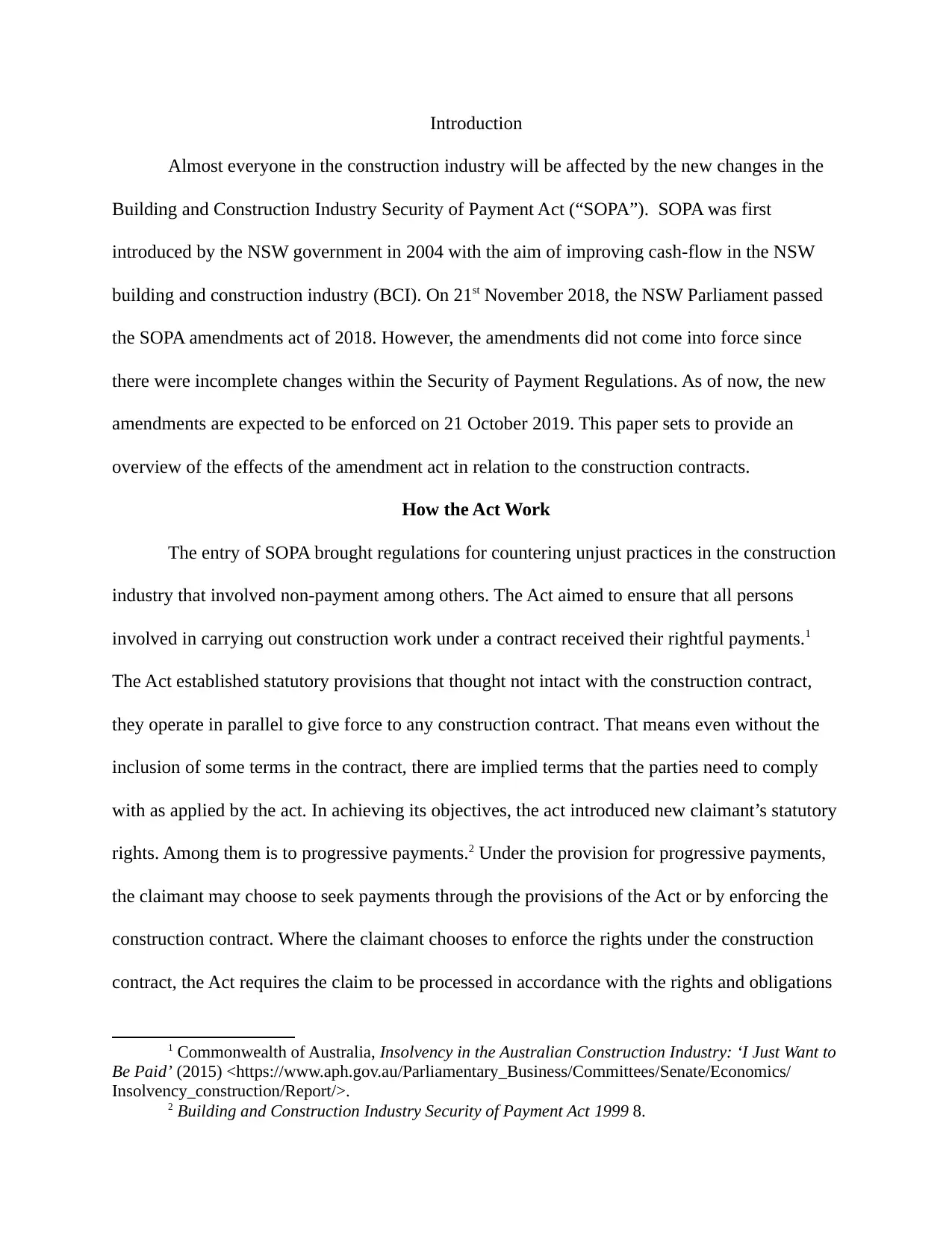
Introduction
Almost everyone in the construction industry will be affected by the new changes in the
Building and Construction Industry Security of Payment Act (“SOPA”). SOPA was first
introduced by the NSW government in 2004 with the aim of improving cash-flow in the NSW
building and construction industry (BCI). On 21st November 2018, the NSW Parliament passed
the SOPA amendments act of 2018. However, the amendments did not come into force since
there were incomplete changes within the Security of Payment Regulations. As of now, the new
amendments are expected to be enforced on 21 October 2019. This paper sets to provide an
overview of the effects of the amendment act in relation to the construction contracts.
How the Act Work
The entry of SOPA brought regulations for countering unjust practices in the construction
industry that involved non-payment among others. The Act aimed to ensure that all persons
involved in carrying out construction work under a contract received their rightful payments.1
The Act established statutory provisions that thought not intact with the construction contract,
they operate in parallel to give force to any construction contract. That means even without the
inclusion of some terms in the contract, there are implied terms that the parties need to comply
with as applied by the act. In achieving its objectives, the act introduced new claimant’s statutory
rights. Among them is to progressive payments.2 Under the provision for progressive payments,
the claimant may choose to seek payments through the provisions of the Act or by enforcing the
construction contract. Where the claimant chooses to enforce the rights under the construction
contract, the Act requires the claim to be processed in accordance with the rights and obligations
1 Commonwealth of Australia, Insolvency in the Australian Construction Industry: ‘I Just Want to
Be Paid’ (2015) <https://www.aph.gov.au/Parliamentary_Business/Committees/Senate/Economics/
Insolvency_construction/Report/>.
2 Building and Construction Industry Security of Payment Act 1999 8.
Almost everyone in the construction industry will be affected by the new changes in the
Building and Construction Industry Security of Payment Act (“SOPA”). SOPA was first
introduced by the NSW government in 2004 with the aim of improving cash-flow in the NSW
building and construction industry (BCI). On 21st November 2018, the NSW Parliament passed
the SOPA amendments act of 2018. However, the amendments did not come into force since
there were incomplete changes within the Security of Payment Regulations. As of now, the new
amendments are expected to be enforced on 21 October 2019. This paper sets to provide an
overview of the effects of the amendment act in relation to the construction contracts.
How the Act Work
The entry of SOPA brought regulations for countering unjust practices in the construction
industry that involved non-payment among others. The Act aimed to ensure that all persons
involved in carrying out construction work under a contract received their rightful payments.1
The Act established statutory provisions that thought not intact with the construction contract,
they operate in parallel to give force to any construction contract. That means even without the
inclusion of some terms in the contract, there are implied terms that the parties need to comply
with as applied by the act. In achieving its objectives, the act introduced new claimant’s statutory
rights. Among them is to progressive payments.2 Under the provision for progressive payments,
the claimant may choose to seek payments through the provisions of the Act or by enforcing the
construction contract. Where the claimant chooses to enforce the rights under the construction
contract, the Act requires the claim to be processed in accordance with the rights and obligations
1 Commonwealth of Australia, Insolvency in the Australian Construction Industry: ‘I Just Want to
Be Paid’ (2015) <https://www.aph.gov.au/Parliamentary_Business/Committees/Senate/Economics/
Insolvency_construction/Report/>.
2 Building and Construction Industry Security of Payment Act 1999 8.
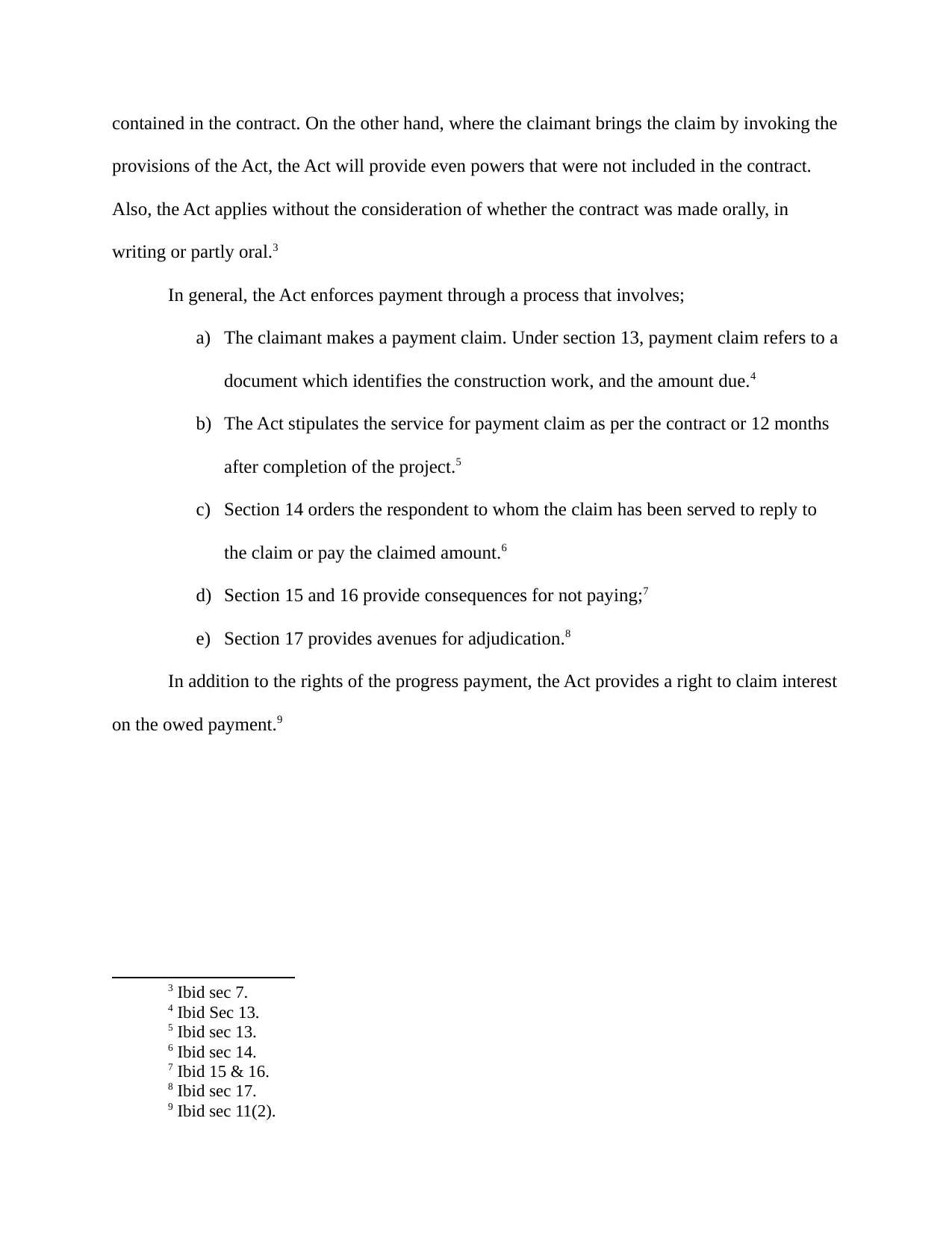
contained in the contract. On the other hand, where the claimant brings the claim by invoking the
provisions of the Act, the Act will provide even powers that were not included in the contract.
Also, the Act applies without the consideration of whether the contract was made orally, in
writing or partly oral.3
In general, the Act enforces payment through a process that involves;
a) The claimant makes a payment claim. Under section 13, payment claim refers to a
document which identifies the construction work, and the amount due.4
b) The Act stipulates the service for payment claim as per the contract or 12 months
after completion of the project.5
c) Section 14 orders the respondent to whom the claim has been served to reply to
the claim or pay the claimed amount.6
d) Section 15 and 16 provide consequences for not paying;7
e) Section 17 provides avenues for adjudication.8
In addition to the rights of the progress payment, the Act provides a right to claim interest
on the owed payment.9
3 Ibid sec 7.
4 Ibid Sec 13.
5 Ibid sec 13.
6 Ibid sec 14.
7 Ibid 15 & 16.
8 Ibid sec 17.
9 Ibid sec 11(2).
provisions of the Act, the Act will provide even powers that were not included in the contract.
Also, the Act applies without the consideration of whether the contract was made orally, in
writing or partly oral.3
In general, the Act enforces payment through a process that involves;
a) The claimant makes a payment claim. Under section 13, payment claim refers to a
document which identifies the construction work, and the amount due.4
b) The Act stipulates the service for payment claim as per the contract or 12 months
after completion of the project.5
c) Section 14 orders the respondent to whom the claim has been served to reply to
the claim or pay the claimed amount.6
d) Section 15 and 16 provide consequences for not paying;7
e) Section 17 provides avenues for adjudication.8
In addition to the rights of the progress payment, the Act provides a right to claim interest
on the owed payment.9
3 Ibid sec 7.
4 Ibid Sec 13.
5 Ibid sec 13.
6 Ibid sec 14.
7 Ibid 15 & 16.
8 Ibid sec 17.
9 Ibid sec 11(2).
⊘ This is a preview!⊘
Do you want full access?
Subscribe today to unlock all pages.

Trusted by 1+ million students worldwide
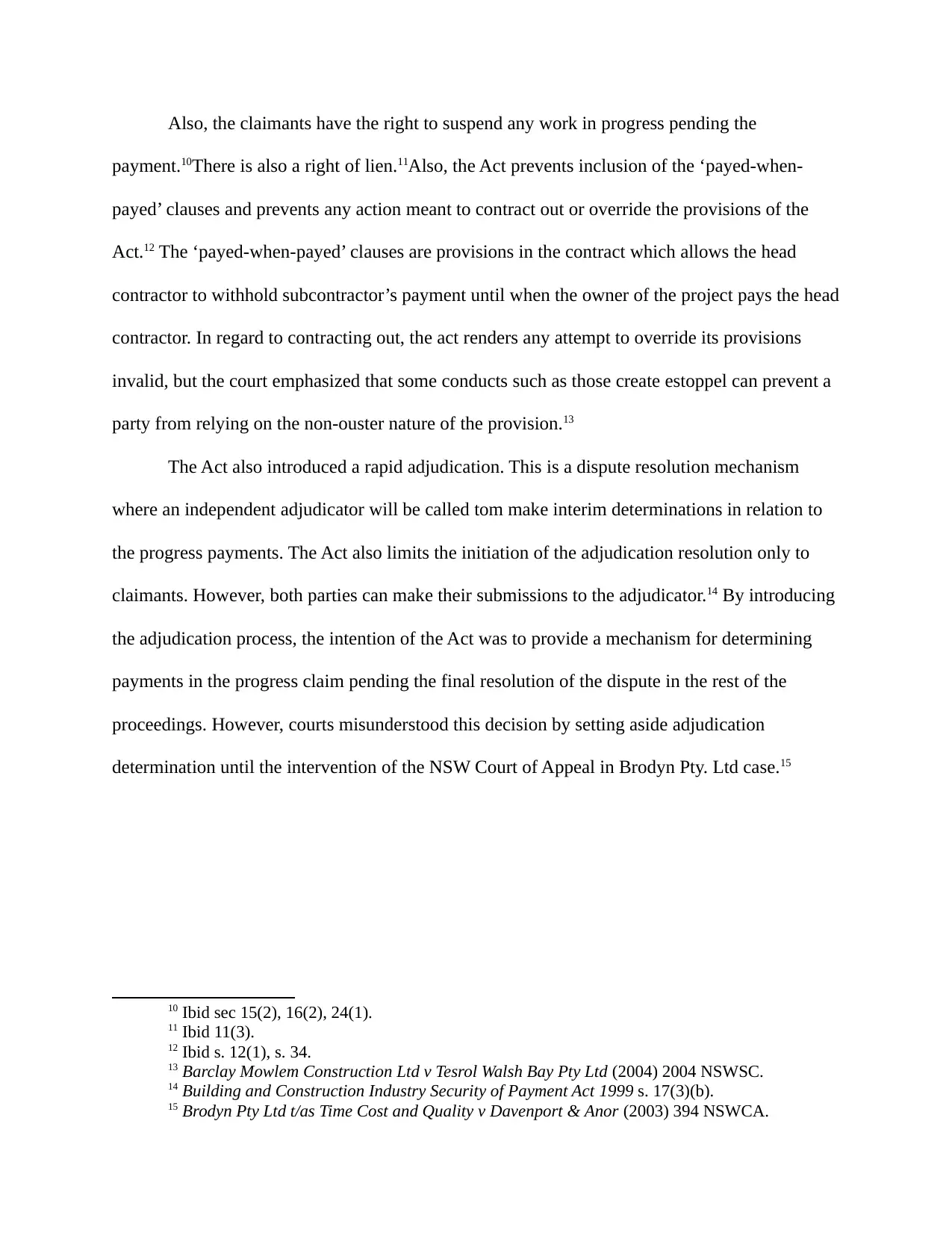
Also, the claimants have the right to suspend any work in progress pending the
payment.10There is also a right of lien.11Also, the Act prevents inclusion of the ‘payed-when-
payed’ clauses and prevents any action meant to contract out or override the provisions of the
Act.12 The ‘payed-when-payed’ clauses are provisions in the contract which allows the head
contractor to withhold subcontractor’s payment until when the owner of the project pays the head
contractor. In regard to contracting out, the act renders any attempt to override its provisions
invalid, but the court emphasized that some conducts such as those create estoppel can prevent a
party from relying on the non-ouster nature of the provision.13
The Act also introduced a rapid adjudication. This is a dispute resolution mechanism
where an independent adjudicator will be called tom make interim determinations in relation to
the progress payments. The Act also limits the initiation of the adjudication resolution only to
claimants. However, both parties can make their submissions to the adjudicator.14 By introducing
the adjudication process, the intention of the Act was to provide a mechanism for determining
payments in the progress claim pending the final resolution of the dispute in the rest of the
proceedings. However, courts misunderstood this decision by setting aside adjudication
determination until the intervention of the NSW Court of Appeal in Brodyn Pty. Ltd case.15
10 Ibid sec 15(2), 16(2), 24(1).
11 Ibid 11(3).
12 Ibid s. 12(1), s. 34.
13 Barclay Mowlem Construction Ltd v Tesrol Walsh Bay Pty Ltd (2004) 2004 NSWSC.
14 Building and Construction Industry Security of Payment Act 1999 s. 17(3)(b).
15 Brodyn Pty Ltd t/as Time Cost and Quality v Davenport & Anor (2003) 394 NSWCA.
payment.10There is also a right of lien.11Also, the Act prevents inclusion of the ‘payed-when-
payed’ clauses and prevents any action meant to contract out or override the provisions of the
Act.12 The ‘payed-when-payed’ clauses are provisions in the contract which allows the head
contractor to withhold subcontractor’s payment until when the owner of the project pays the head
contractor. In regard to contracting out, the act renders any attempt to override its provisions
invalid, but the court emphasized that some conducts such as those create estoppel can prevent a
party from relying on the non-ouster nature of the provision.13
The Act also introduced a rapid adjudication. This is a dispute resolution mechanism
where an independent adjudicator will be called tom make interim determinations in relation to
the progress payments. The Act also limits the initiation of the adjudication resolution only to
claimants. However, both parties can make their submissions to the adjudicator.14 By introducing
the adjudication process, the intention of the Act was to provide a mechanism for determining
payments in the progress claim pending the final resolution of the dispute in the rest of the
proceedings. However, courts misunderstood this decision by setting aside adjudication
determination until the intervention of the NSW Court of Appeal in Brodyn Pty. Ltd case.15
10 Ibid sec 15(2), 16(2), 24(1).
11 Ibid 11(3).
12 Ibid s. 12(1), s. 34.
13 Barclay Mowlem Construction Ltd v Tesrol Walsh Bay Pty Ltd (2004) 2004 NSWSC.
14 Building and Construction Industry Security of Payment Act 1999 s. 17(3)(b).
15 Brodyn Pty Ltd t/as Time Cost and Quality v Davenport & Anor (2003) 394 NSWCA.
Paraphrase This Document
Need a fresh take? Get an instant paraphrase of this document with our AI Paraphraser
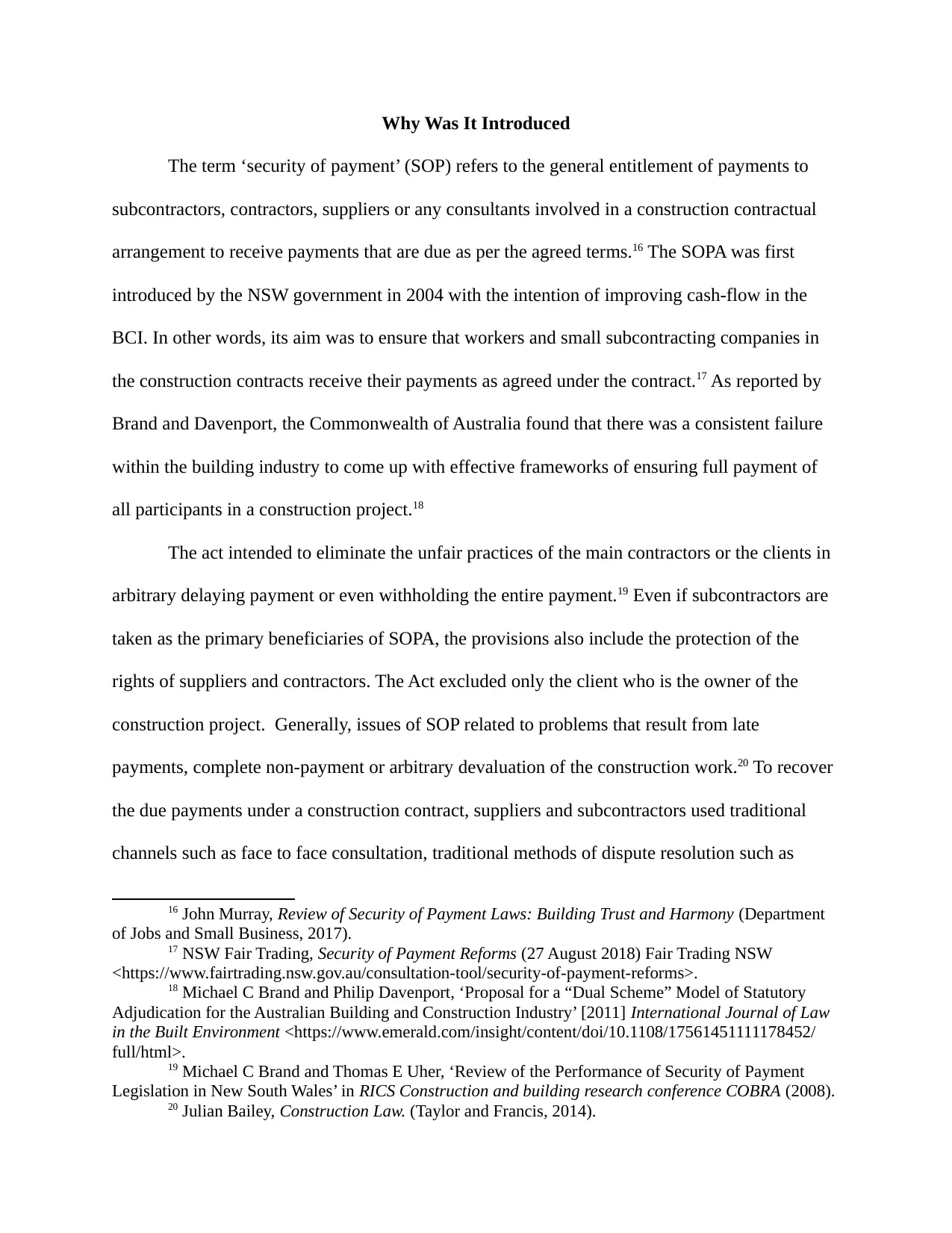
Why Was It Introduced
The term ‘security of payment’ (SOP) refers to the general entitlement of payments to
subcontractors, contractors, suppliers or any consultants involved in a construction contractual
arrangement to receive payments that are due as per the agreed terms.16 The SOPA was first
introduced by the NSW government in 2004 with the intention of improving cash-flow in the
BCI. In other words, its aim was to ensure that workers and small subcontracting companies in
the construction contracts receive their payments as agreed under the contract.17 As reported by
Brand and Davenport, the Commonwealth of Australia found that there was a consistent failure
within the building industry to come up with effective frameworks of ensuring full payment of
all participants in a construction project.18
The act intended to eliminate the unfair practices of the main contractors or the clients in
arbitrary delaying payment or even withholding the entire payment.19 Even if subcontractors are
taken as the primary beneficiaries of SOPA, the provisions also include the protection of the
rights of suppliers and contractors. The Act excluded only the client who is the owner of the
construction project. Generally, issues of SOP related to problems that result from late
payments, complete non-payment or arbitrary devaluation of the construction work.20 To recover
the due payments under a construction contract, suppliers and subcontractors used traditional
channels such as face to face consultation, traditional methods of dispute resolution such as
16 John Murray, Review of Security of Payment Laws: Building Trust and Harmony (Department
of Jobs and Small Business, 2017).
17 NSW Fair Trading, Security of Payment Reforms (27 August 2018) Fair Trading NSW
<https://www.fairtrading.nsw.gov.au/consultation-tool/security-of-payment-reforms>.
18 Michael C Brand and Philip Davenport, ‘Proposal for a “Dual Scheme” Model of Statutory
Adjudication for the Australian Building and Construction Industry’ [2011] International Journal of Law
in the Built Environment <https://www.emerald.com/insight/content/doi/10.1108/17561451111178452/
full/html>.
19 Michael C Brand and Thomas E Uher, ‘Review of the Performance of Security of Payment
Legislation in New South Wales’ in RICS Construction and building research conference COBRA (2008).
20 Julian Bailey, Construction Law. (Taylor and Francis, 2014).
The term ‘security of payment’ (SOP) refers to the general entitlement of payments to
subcontractors, contractors, suppliers or any consultants involved in a construction contractual
arrangement to receive payments that are due as per the agreed terms.16 The SOPA was first
introduced by the NSW government in 2004 with the intention of improving cash-flow in the
BCI. In other words, its aim was to ensure that workers and small subcontracting companies in
the construction contracts receive their payments as agreed under the contract.17 As reported by
Brand and Davenport, the Commonwealth of Australia found that there was a consistent failure
within the building industry to come up with effective frameworks of ensuring full payment of
all participants in a construction project.18
The act intended to eliminate the unfair practices of the main contractors or the clients in
arbitrary delaying payment or even withholding the entire payment.19 Even if subcontractors are
taken as the primary beneficiaries of SOPA, the provisions also include the protection of the
rights of suppliers and contractors. The Act excluded only the client who is the owner of the
construction project. Generally, issues of SOP related to problems that result from late
payments, complete non-payment or arbitrary devaluation of the construction work.20 To recover
the due payments under a construction contract, suppliers and subcontractors used traditional
channels such as face to face consultation, traditional methods of dispute resolution such as
16 John Murray, Review of Security of Payment Laws: Building Trust and Harmony (Department
of Jobs and Small Business, 2017).
17 NSW Fair Trading, Security of Payment Reforms (27 August 2018) Fair Trading NSW
<https://www.fairtrading.nsw.gov.au/consultation-tool/security-of-payment-reforms>.
18 Michael C Brand and Philip Davenport, ‘Proposal for a “Dual Scheme” Model of Statutory
Adjudication for the Australian Building and Construction Industry’ [2011] International Journal of Law
in the Built Environment <https://www.emerald.com/insight/content/doi/10.1108/17561451111178452/
full/html>.
19 Michael C Brand and Thomas E Uher, ‘Review of the Performance of Security of Payment
Legislation in New South Wales’ in RICS Construction and building research conference COBRA (2008).
20 Julian Bailey, Construction Law. (Taylor and Francis, 2014).
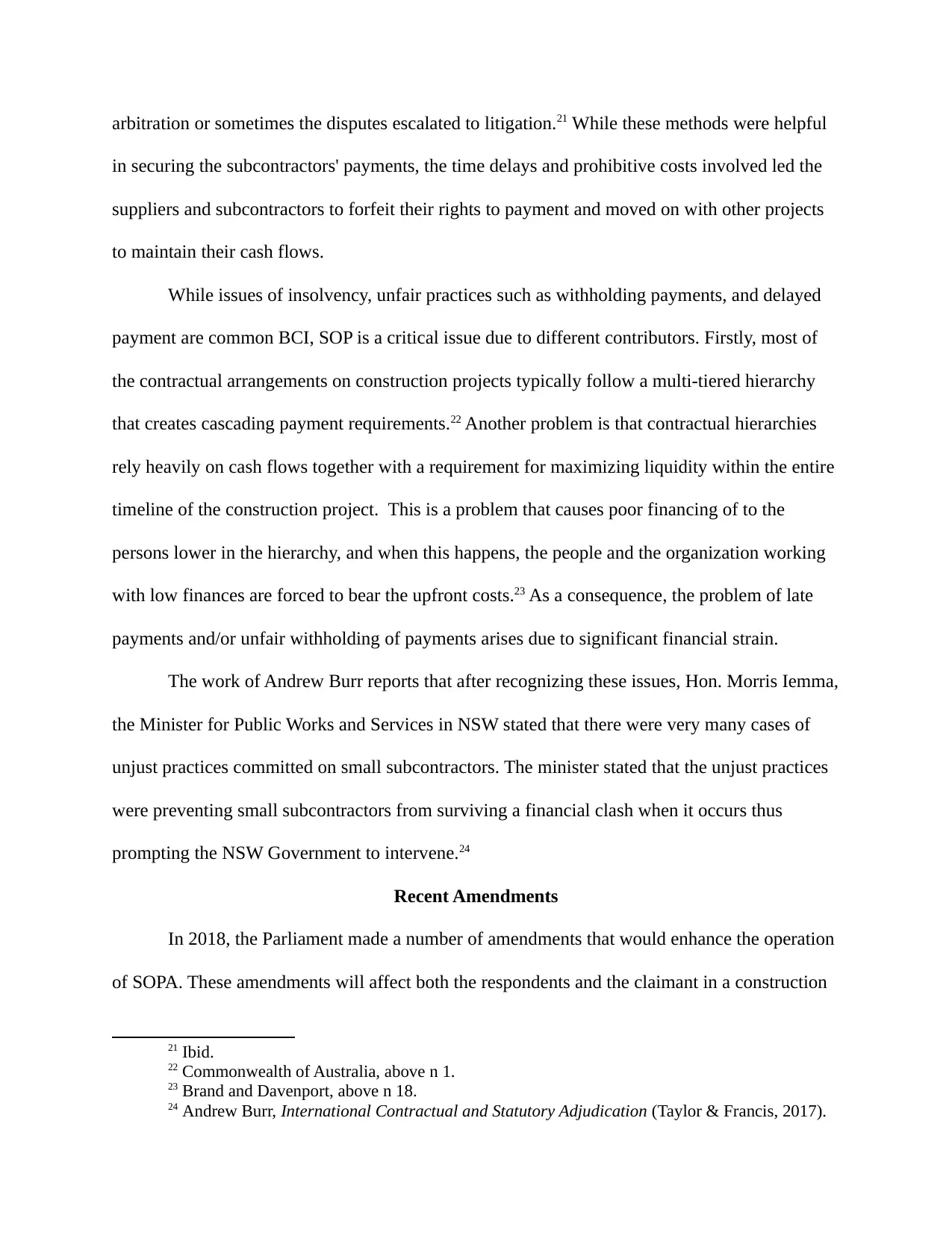
arbitration or sometimes the disputes escalated to litigation.21 While these methods were helpful
in securing the subcontractors' payments, the time delays and prohibitive costs involved led the
suppliers and subcontractors to forfeit their rights to payment and moved on with other projects
to maintain their cash flows.
While issues of insolvency, unfair practices such as withholding payments, and delayed
payment are common BCI, SOP is a critical issue due to different contributors. Firstly, most of
the contractual arrangements on construction projects typically follow a multi-tiered hierarchy
that creates cascading payment requirements.22 Another problem is that contractual hierarchies
rely heavily on cash flows together with a requirement for maximizing liquidity within the entire
timeline of the construction project. This is a problem that causes poor financing of to the
persons lower in the hierarchy, and when this happens, the people and the organization working
with low finances are forced to bear the upfront costs.23 As a consequence, the problem of late
payments and/or unfair withholding of payments arises due to significant financial strain.
The work of Andrew Burr reports that after recognizing these issues, Hon. Morris Iemma,
the Minister for Public Works and Services in NSW stated that there were very many cases of
unjust practices committed on small subcontractors. The minister stated that the unjust practices
were preventing small subcontractors from surviving a financial clash when it occurs thus
prompting the NSW Government to intervene.24
Recent Amendments
In 2018, the Parliament made a number of amendments that would enhance the operation
of SOPA. These amendments will affect both the respondents and the claimant in a construction
21 Ibid.
22 Commonwealth of Australia, above n 1.
23 Brand and Davenport, above n 18.
24 Andrew Burr, International Contractual and Statutory Adjudication (Taylor & Francis, 2017).
in securing the subcontractors' payments, the time delays and prohibitive costs involved led the
suppliers and subcontractors to forfeit their rights to payment and moved on with other projects
to maintain their cash flows.
While issues of insolvency, unfair practices such as withholding payments, and delayed
payment are common BCI, SOP is a critical issue due to different contributors. Firstly, most of
the contractual arrangements on construction projects typically follow a multi-tiered hierarchy
that creates cascading payment requirements.22 Another problem is that contractual hierarchies
rely heavily on cash flows together with a requirement for maximizing liquidity within the entire
timeline of the construction project. This is a problem that causes poor financing of to the
persons lower in the hierarchy, and when this happens, the people and the organization working
with low finances are forced to bear the upfront costs.23 As a consequence, the problem of late
payments and/or unfair withholding of payments arises due to significant financial strain.
The work of Andrew Burr reports that after recognizing these issues, Hon. Morris Iemma,
the Minister for Public Works and Services in NSW stated that there were very many cases of
unjust practices committed on small subcontractors. The minister stated that the unjust practices
were preventing small subcontractors from surviving a financial clash when it occurs thus
prompting the NSW Government to intervene.24
Recent Amendments
In 2018, the Parliament made a number of amendments that would enhance the operation
of SOPA. These amendments will affect both the respondents and the claimant in a construction
21 Ibid.
22 Commonwealth of Australia, above n 1.
23 Brand and Davenport, above n 18.
24 Andrew Burr, International Contractual and Statutory Adjudication (Taylor & Francis, 2017).
⊘ This is a preview!⊘
Do you want full access?
Subscribe today to unlock all pages.

Trusted by 1+ million students worldwide
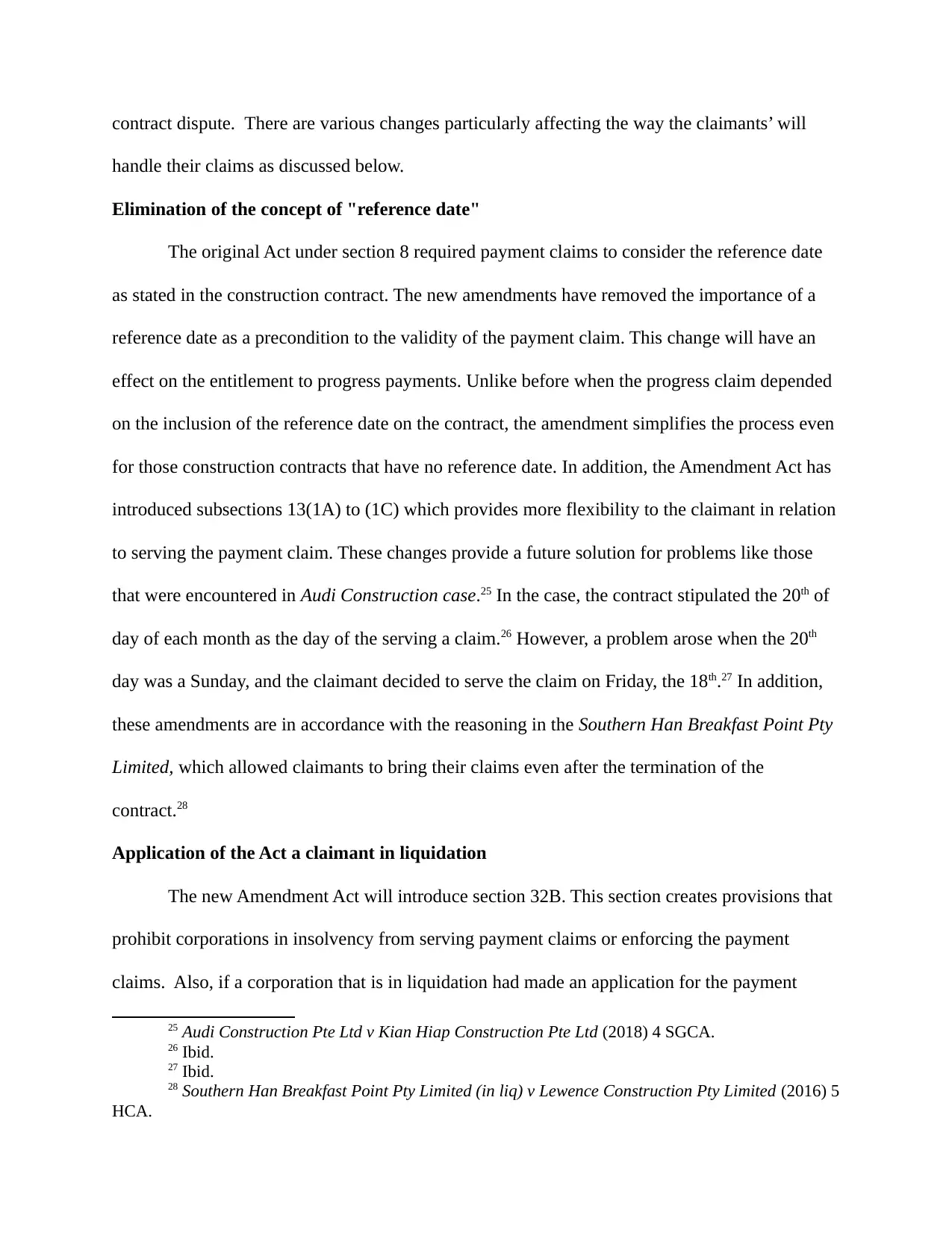
contract dispute. There are various changes particularly affecting the way the claimants’ will
handle their claims as discussed below.
Elimination of the concept of "reference date"
The original Act under section 8 required payment claims to consider the reference date
as stated in the construction contract. The new amendments have removed the importance of a
reference date as a precondition to the validity of the payment claim. This change will have an
effect on the entitlement to progress payments. Unlike before when the progress claim depended
on the inclusion of the reference date on the contract, the amendment simplifies the process even
for those construction contracts that have no reference date. In addition, the Amendment Act has
introduced subsections 13(1A) to (1C) which provides more flexibility to the claimant in relation
to serving the payment claim. These changes provide a future solution for problems like those
that were encountered in Audi Construction case.25 In the case, the contract stipulated the 20th of
day of each month as the day of the serving a claim.26 However, a problem arose when the 20th
day was a Sunday, and the claimant decided to serve the claim on Friday, the 18th.27 In addition,
these amendments are in accordance with the reasoning in the Southern Han Breakfast Point Pty
Limited, which allowed claimants to bring their claims even after the termination of the
contract.28
Application of the Act a claimant in liquidation
The new Amendment Act will introduce section 32B. This section creates provisions that
prohibit corporations in insolvency from serving payment claims or enforcing the payment
claims. Also, if a corporation that is in liquidation had made an application for the payment
25 Audi Construction Pte Ltd v Kian Hiap Construction Pte Ltd (2018) 4 SGCA.
26 Ibid.
27 Ibid.
28 Southern Han Breakfast Point Pty Limited (in liq) v Lewence Construction Pty Limited (2016) 5
HCA.
handle their claims as discussed below.
Elimination of the concept of "reference date"
The original Act under section 8 required payment claims to consider the reference date
as stated in the construction contract. The new amendments have removed the importance of a
reference date as a precondition to the validity of the payment claim. This change will have an
effect on the entitlement to progress payments. Unlike before when the progress claim depended
on the inclusion of the reference date on the contract, the amendment simplifies the process even
for those construction contracts that have no reference date. In addition, the Amendment Act has
introduced subsections 13(1A) to (1C) which provides more flexibility to the claimant in relation
to serving the payment claim. These changes provide a future solution for problems like those
that were encountered in Audi Construction case.25 In the case, the contract stipulated the 20th of
day of each month as the day of the serving a claim.26 However, a problem arose when the 20th
day was a Sunday, and the claimant decided to serve the claim on Friday, the 18th.27 In addition,
these amendments are in accordance with the reasoning in the Southern Han Breakfast Point Pty
Limited, which allowed claimants to bring their claims even after the termination of the
contract.28
Application of the Act a claimant in liquidation
The new Amendment Act will introduce section 32B. This section creates provisions that
prohibit corporations in insolvency from serving payment claims or enforcing the payment
claims. Also, if a corporation that is in liquidation had made an application for the payment
25 Audi Construction Pte Ltd v Kian Hiap Construction Pte Ltd (2018) 4 SGCA.
26 Ibid.
27 Ibid.
28 Southern Han Breakfast Point Pty Limited (in liq) v Lewence Construction Pty Limited (2016) 5
HCA.
Paraphrase This Document
Need a fresh take? Get an instant paraphrase of this document with our AI Paraphraser
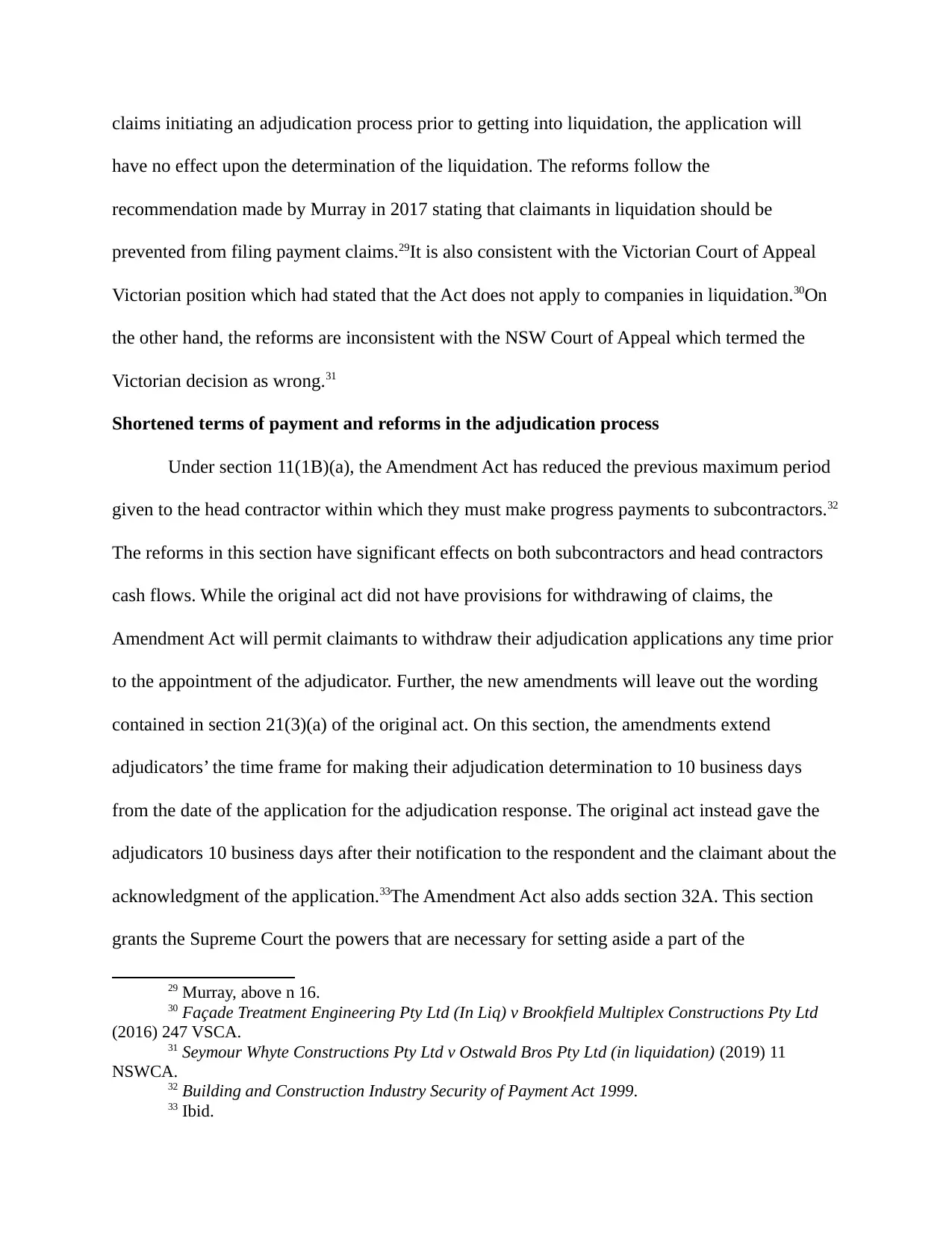
claims initiating an adjudication process prior to getting into liquidation, the application will
have no effect upon the determination of the liquidation. The reforms follow the
recommendation made by Murray in 2017 stating that claimants in liquidation should be
prevented from filing payment claims.29It is also consistent with the Victorian Court of Appeal
Victorian position which had stated that the Act does not apply to companies in liquidation.30On
the other hand, the reforms are inconsistent with the NSW Court of Appeal which termed the
Victorian decision as wrong.31
Shortened terms of payment and reforms in the adjudication process
Under section 11(1B)(a), the Amendment Act has reduced the previous maximum period
given to the head contractor within which they must make progress payments to subcontractors.32
The reforms in this section have significant effects on both subcontractors and head contractors
cash flows. While the original act did not have provisions for withdrawing of claims, the
Amendment Act will permit claimants to withdraw their adjudication applications any time prior
to the appointment of the adjudicator. Further, the new amendments will leave out the wording
contained in section 21(3)(a) of the original act. On this section, the amendments extend
adjudicators’ the time frame for making their adjudication determination to 10 business days
from the date of the application for the adjudication response. The original act instead gave the
adjudicators 10 business days after their notification to the respondent and the claimant about the
acknowledgment of the application.33The Amendment Act also adds section 32A. This section
grants the Supreme Court the powers that are necessary for setting aside a part of the
29 Murray, above n 16.
30 Façade Treatment Engineering Pty Ltd (In Liq) v Brookfield Multiplex Constructions Pty Ltd
(2016) 247 VSCA.
31 Seymour Whyte Constructions Pty Ltd v Ostwald Bros Pty Ltd (in liquidation) (2019) 11
NSWCA.
32 Building and Construction Industry Security of Payment Act 1999.
33 Ibid.
have no effect upon the determination of the liquidation. The reforms follow the
recommendation made by Murray in 2017 stating that claimants in liquidation should be
prevented from filing payment claims.29It is also consistent with the Victorian Court of Appeal
Victorian position which had stated that the Act does not apply to companies in liquidation.30On
the other hand, the reforms are inconsistent with the NSW Court of Appeal which termed the
Victorian decision as wrong.31
Shortened terms of payment and reforms in the adjudication process
Under section 11(1B)(a), the Amendment Act has reduced the previous maximum period
given to the head contractor within which they must make progress payments to subcontractors.32
The reforms in this section have significant effects on both subcontractors and head contractors
cash flows. While the original act did not have provisions for withdrawing of claims, the
Amendment Act will permit claimants to withdraw their adjudication applications any time prior
to the appointment of the adjudicator. Further, the new amendments will leave out the wording
contained in section 21(3)(a) of the original act. On this section, the amendments extend
adjudicators’ the time frame for making their adjudication determination to 10 business days
from the date of the application for the adjudication response. The original act instead gave the
adjudicators 10 business days after their notification to the respondent and the claimant about the
acknowledgment of the application.33The Amendment Act also adds section 32A. This section
grants the Supreme Court the powers that are necessary for setting aside a part of the
29 Murray, above n 16.
30 Façade Treatment Engineering Pty Ltd (In Liq) v Brookfield Multiplex Constructions Pty Ltd
(2016) 247 VSCA.
31 Seymour Whyte Constructions Pty Ltd v Ostwald Bros Pty Ltd (in liquidation) (2019) 11
NSWCA.
32 Building and Construction Industry Security of Payment Act 1999.
33 Ibid.
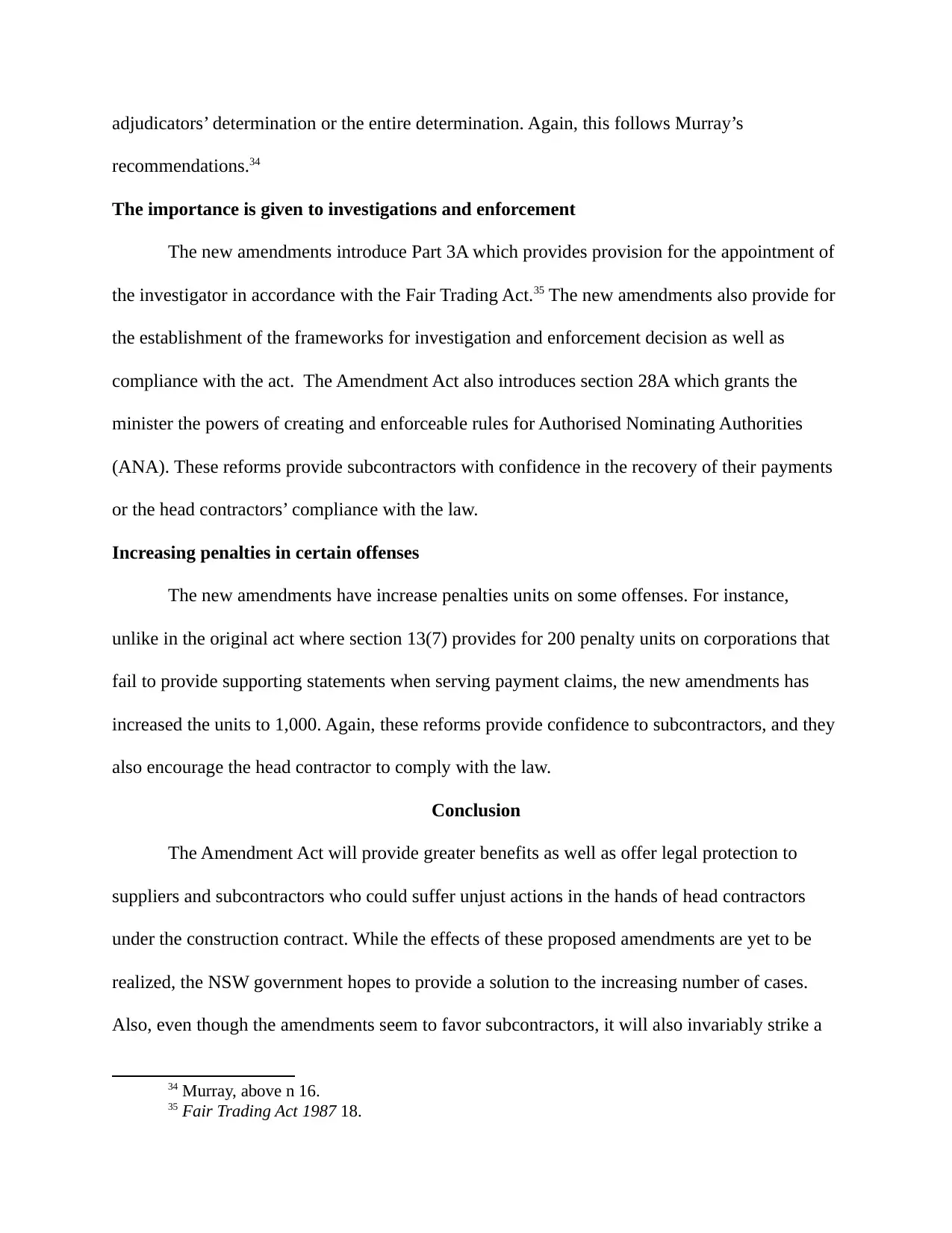
adjudicators’ determination or the entire determination. Again, this follows Murray’s
recommendations.34
The importance is given to investigations and enforcement
The new amendments introduce Part 3A which provides provision for the appointment of
the investigator in accordance with the Fair Trading Act.35 The new amendments also provide for
the establishment of the frameworks for investigation and enforcement decision as well as
compliance with the act. The Amendment Act also introduces section 28A which grants the
minister the powers of creating and enforceable rules for Authorised Nominating Authorities
(ANA). These reforms provide subcontractors with confidence in the recovery of their payments
or the head contractors’ compliance with the law.
Increasing penalties in certain offenses
The new amendments have increase penalties units on some offenses. For instance,
unlike in the original act where section 13(7) provides for 200 penalty units on corporations that
fail to provide supporting statements when serving payment claims, the new amendments has
increased the units to 1,000. Again, these reforms provide confidence to subcontractors, and they
also encourage the head contractor to comply with the law.
Conclusion
The Amendment Act will provide greater benefits as well as offer legal protection to
suppliers and subcontractors who could suffer unjust actions in the hands of head contractors
under the construction contract. While the effects of these proposed amendments are yet to be
realized, the NSW government hopes to provide a solution to the increasing number of cases.
Also, even though the amendments seem to favor subcontractors, it will also invariably strike a
34 Murray, above n 16.
35 Fair Trading Act 1987 18.
recommendations.34
The importance is given to investigations and enforcement
The new amendments introduce Part 3A which provides provision for the appointment of
the investigator in accordance with the Fair Trading Act.35 The new amendments also provide for
the establishment of the frameworks for investigation and enforcement decision as well as
compliance with the act. The Amendment Act also introduces section 28A which grants the
minister the powers of creating and enforceable rules for Authorised Nominating Authorities
(ANA). These reforms provide subcontractors with confidence in the recovery of their payments
or the head contractors’ compliance with the law.
Increasing penalties in certain offenses
The new amendments have increase penalties units on some offenses. For instance,
unlike in the original act where section 13(7) provides for 200 penalty units on corporations that
fail to provide supporting statements when serving payment claims, the new amendments has
increased the units to 1,000. Again, these reforms provide confidence to subcontractors, and they
also encourage the head contractor to comply with the law.
Conclusion
The Amendment Act will provide greater benefits as well as offer legal protection to
suppliers and subcontractors who could suffer unjust actions in the hands of head contractors
under the construction contract. While the effects of these proposed amendments are yet to be
realized, the NSW government hopes to provide a solution to the increasing number of cases.
Also, even though the amendments seem to favor subcontractors, it will also invariably strike a
34 Murray, above n 16.
35 Fair Trading Act 1987 18.
⊘ This is a preview!⊘
Do you want full access?
Subscribe today to unlock all pages.

Trusted by 1+ million students worldwide

balance in the industry especially between the rival interests of the different stakeholders within
the industry.
the industry.
Paraphrase This Document
Need a fresh take? Get an instant paraphrase of this document with our AI Paraphraser
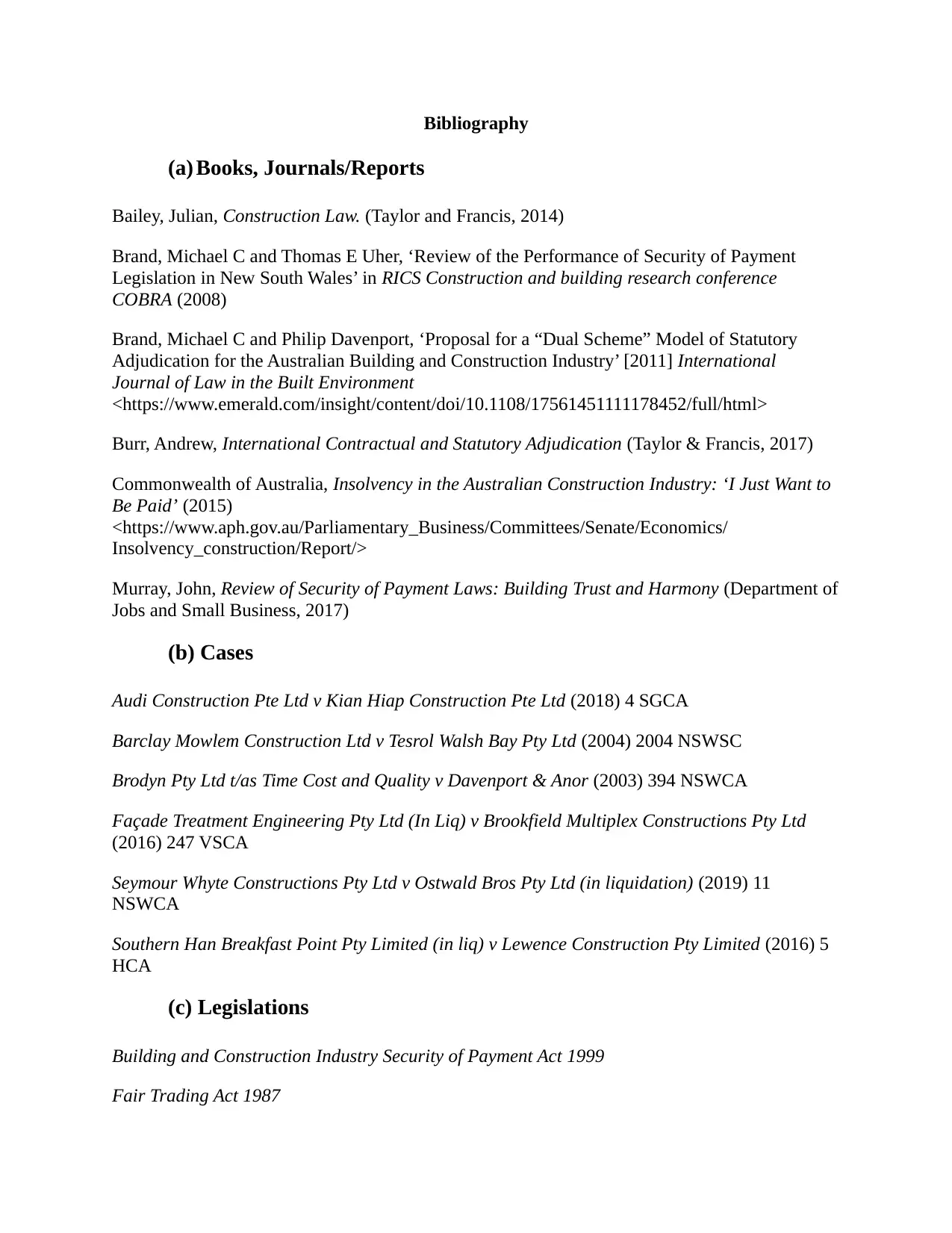
Bibliography
(a) Books, Journals/Reports
Bailey, Julian, Construction Law. (Taylor and Francis, 2014)
Brand, Michael C and Thomas E Uher, ‘Review of the Performance of Security of Payment
Legislation in New South Wales’ in RICS Construction and building research conference
COBRA (2008)
Brand, Michael C and Philip Davenport, ‘Proposal for a “Dual Scheme” Model of Statutory
Adjudication for the Australian Building and Construction Industry’ [2011] International
Journal of Law in the Built Environment
<https://www.emerald.com/insight/content/doi/10.1108/17561451111178452/full/html>
Burr, Andrew, International Contractual and Statutory Adjudication (Taylor & Francis, 2017)
Commonwealth of Australia, Insolvency in the Australian Construction Industry: ‘I Just Want to
Be Paid’ (2015)
<https://www.aph.gov.au/Parliamentary_Business/Committees/Senate/Economics/
Insolvency_construction/Report/>
Murray, John, Review of Security of Payment Laws: Building Trust and Harmony (Department of
Jobs and Small Business, 2017)
(b) Cases
Audi Construction Pte Ltd v Kian Hiap Construction Pte Ltd (2018) 4 SGCA
Barclay Mowlem Construction Ltd v Tesrol Walsh Bay Pty Ltd (2004) 2004 NSWSC
Brodyn Pty Ltd t/as Time Cost and Quality v Davenport & Anor (2003) 394 NSWCA
Façade Treatment Engineering Pty Ltd (In Liq) v Brookfield Multiplex Constructions Pty Ltd
(2016) 247 VSCA
Seymour Whyte Constructions Pty Ltd v Ostwald Bros Pty Ltd (in liquidation) (2019) 11
NSWCA
Southern Han Breakfast Point Pty Limited (in liq) v Lewence Construction Pty Limited (2016) 5
HCA
(c) Legislations
Building and Construction Industry Security of Payment Act 1999
Fair Trading Act 1987
(a) Books, Journals/Reports
Bailey, Julian, Construction Law. (Taylor and Francis, 2014)
Brand, Michael C and Thomas E Uher, ‘Review of the Performance of Security of Payment
Legislation in New South Wales’ in RICS Construction and building research conference
COBRA (2008)
Brand, Michael C and Philip Davenport, ‘Proposal for a “Dual Scheme” Model of Statutory
Adjudication for the Australian Building and Construction Industry’ [2011] International
Journal of Law in the Built Environment
<https://www.emerald.com/insight/content/doi/10.1108/17561451111178452/full/html>
Burr, Andrew, International Contractual and Statutory Adjudication (Taylor & Francis, 2017)
Commonwealth of Australia, Insolvency in the Australian Construction Industry: ‘I Just Want to
Be Paid’ (2015)
<https://www.aph.gov.au/Parliamentary_Business/Committees/Senate/Economics/
Insolvency_construction/Report/>
Murray, John, Review of Security of Payment Laws: Building Trust and Harmony (Department of
Jobs and Small Business, 2017)
(b) Cases
Audi Construction Pte Ltd v Kian Hiap Construction Pte Ltd (2018) 4 SGCA
Barclay Mowlem Construction Ltd v Tesrol Walsh Bay Pty Ltd (2004) 2004 NSWSC
Brodyn Pty Ltd t/as Time Cost and Quality v Davenport & Anor (2003) 394 NSWCA
Façade Treatment Engineering Pty Ltd (In Liq) v Brookfield Multiplex Constructions Pty Ltd
(2016) 247 VSCA
Seymour Whyte Constructions Pty Ltd v Ostwald Bros Pty Ltd (in liquidation) (2019) 11
NSWCA
Southern Han Breakfast Point Pty Limited (in liq) v Lewence Construction Pty Limited (2016) 5
HCA
(c) Legislations
Building and Construction Industry Security of Payment Act 1999
Fair Trading Act 1987

NSW Fair Trading, Security of Payment Reforms (27 August 2018) Fair Trading NSW
<https://www.fairtrading.nsw.gov.au/consultation-tool/security-of-payment-reforms>
<https://www.fairtrading.nsw.gov.au/consultation-tool/security-of-payment-reforms>
⊘ This is a preview!⊘
Do you want full access?
Subscribe today to unlock all pages.

Trusted by 1+ million students worldwide
1 out of 12
Related Documents
Your All-in-One AI-Powered Toolkit for Academic Success.
+13062052269
info@desklib.com
Available 24*7 on WhatsApp / Email
![[object Object]](/_next/static/media/star-bottom.7253800d.svg)
Unlock your academic potential
Copyright © 2020–2026 A2Z Services. All Rights Reserved. Developed and managed by ZUCOL.




